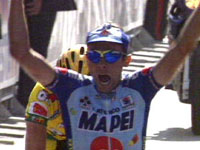Bo Hamburger uses EPO for 2 years in mid-1990s
Bo Hamburger, the former Danish rider, took the banned substance EPO from 1995 to 1997. He became the latest cyclist to admit to doping.

Hamburger, a former Tour de France stage winner, also said doping was so widespread within the sport at the time that it was impossible for clean riders to keep up.
"Cycling was distinctively marked by doping in the 1990s," Hamburger said at a news conference to present his book, "The Greatest Price - a Rider's Confessions," in which he admitted taking EPO.
"It was a little easier to look at oneself in the mirror when you knew others did the same," he said. "So I did it."
Hamburger said cycling meant more to him than his family at the time, and that if he had been forced to chose between his wife and cycling, "I would have kicked her out." His wife, Sanne, was present at the news conference.
The 37-year-old Hamburger is a former rider with the TVM, Casino and CSC Tiscali teams, among others.
Team leaders were not involved in riders taking banned substances, he said.
"But one should have been very naive and very blind not to see what was going on," he said.
Hamburger had earlier denied ever taking any banned substances, but said he started doping after an injury in 1995.
"My alternative would have been to drive the bicycle in the garage and stop the career," Hamburger said in the book.
Hamburger spent 16 years as professional rider before quitting in 2006. His top performances include winning the Walloon Arrow (La Fleche Wallonne) in 1998 and the Tour de France's eighth stage in 1994.
Hamburger said he continued doping until 1997, although it was unclear why he stopped.
"Bo Hamburger's confession illustrates how damaged cycling was by EPO abuse in the 1990s," said Brian Mikkelsen, Denmark's sports minister and World Anti-Doping Agency vice president. "It is decisive that we make sure that we never go back to that time."
In 2005, the French newspaper Le Journal du Dimanche accused Hamburger, Spanish rider Manuel Beltran and Colombia's Joaquim Castelblanco of testing positive for EPO during the 1999 Tour de France. The Dane then called the report "totally ridiculous."
Hamburger was the first rider to test positive for EPO under a new system introduced by the International Cycling Union in 2001. However, he was cleared by the Danish Doping Board because one of the backup samples came back negative.
Hamburger's confession came after a spate of doping-related admissions earlier this year from former top riders in the 1990s, including 1996 Tour winner Bjarne Riis, also a Dane.
Speaking about the recent doping admissions in sports, International Olympic Committee president Jacques Rogge said Wednesday that most confessions were "the result of the athletes being confronted by hard evidence found by judicial authorities."
"I don't think there was true remorse there. I think it is more damage control," Rogge said.
A series of doping scandals also tainted this year's Tour, with the entire Astana team thrown out after pre-race favorite Alexandre Vinokourov tested positive for a blood transfusion after winning the 13th stage.
Danish rider Michael Rasmussen, who held the leader's yellow jersey for much of the race, was also thrown out for allegedly lying to his team about his whereabouts before the race, when he missed two doping tests. He has denied any wrongdoing.
Subscribe to Pravda.Ru Telegram channel, Facebook, RSS!


